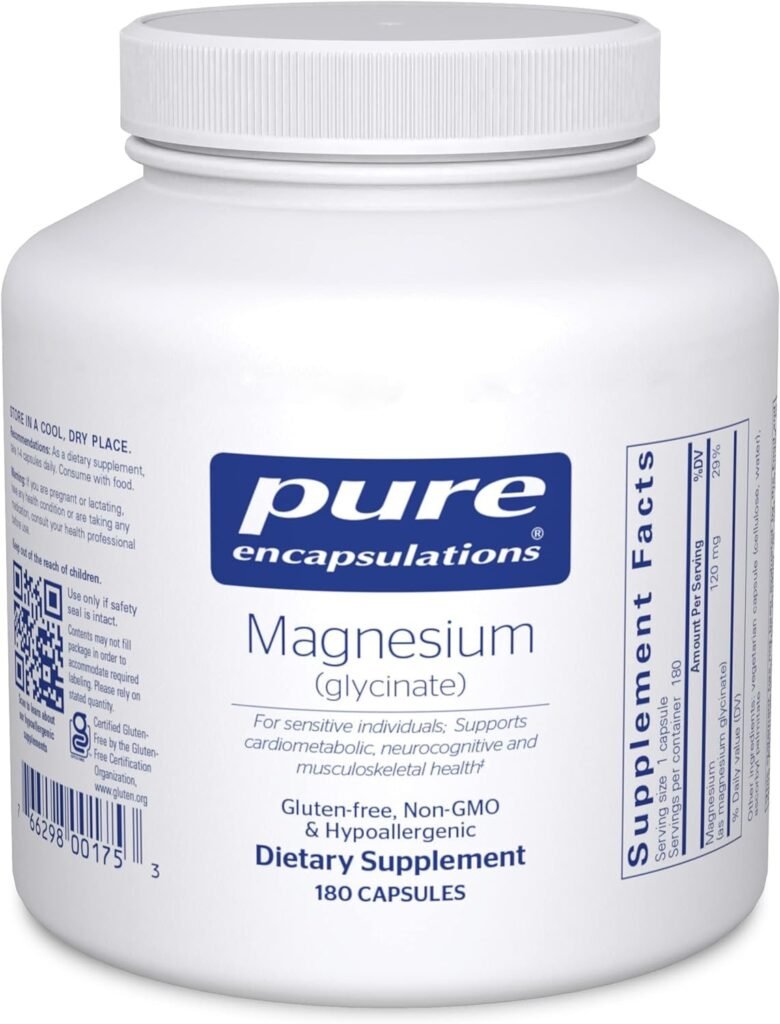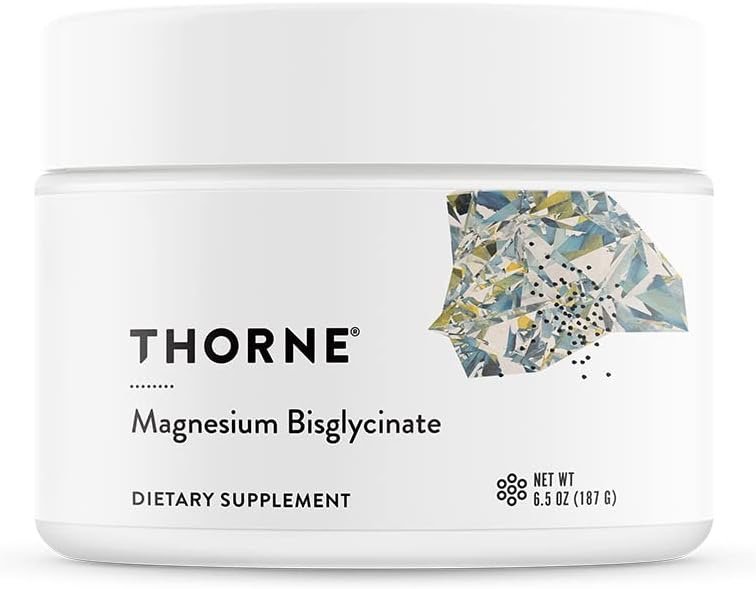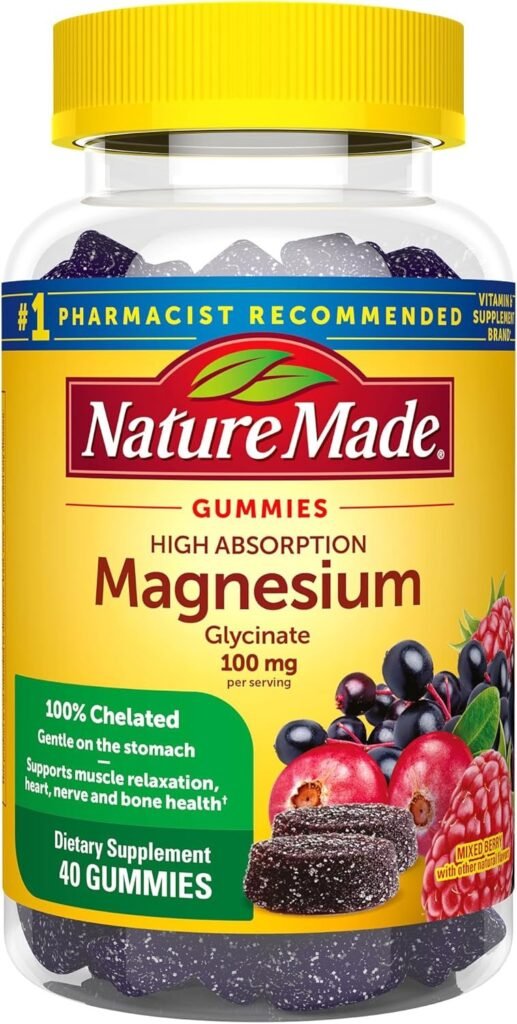Explore the health benefits and various uses of magnesium glycinate, an essential supplement for optimal wellbeing and restful sleep.
Magnesium Glycinate: Benefits and Uses Explained
Did you know nearly 50% of people in the U.S. lack enough magnesium? This fact shows how crucial it is to know about magnesium glycinate supplements. It’s known for being easy for the body to use and absorb. If you’re dealing with anxiety, weak bones, unstable blood sugar, or trouble sleeping, magnesium glycinate can help.

Magnesium glycinate helps with many health issues. It can fix problems caused by magnesium lack and make sleep better. It’s a key supplement for daily health.
Key Takeaways
- Magnesium glycinate is easy for the body to use and absorb.
- About 50% of people in the U.S. don’t get enough magnesium, showing the need for supplements.
- It’s used for anxiety, bone health, and managing blood sugar.
- It comes in pills and powder form and is easy to take.
- Talk to a doctor before taking magnesium glycinate, especially if you have health issues.
What is Magnesium Glycinate?
Magnesium glycinate is a key mineral supplement. It combines elemental magnesium with glycine, an amino acid. This makes it a top choice among magnesium supplements and helps your body absorb it better.
Composition and Formation
Magnesium glycinate is made by linking magnesium with glycine, an amino acid that helps calm the body. This combo boosts how well your body absorbs magnesium. It’s gentler on your stomach, making it great for those looking to boost their magnesium levels.
Comparison with Other Magnesium Forms
When we look at magnesium glycinate versus other forms, its benefits shine. For instance, magnesium oxide is cheap but not well absorbed and mainly used for heartburn and constipation. Magnesium chloride is absorbed well and helps with low magnesium levels. But, magnesium citrate is highly absorbed but might cause loose stools.
Studies show magnesium glycinate is best for absorption and doesn’t upset your stomach. It’s a solid choice for those needing a steady magnesium source.
In short, magnesium glycinate is top-notch for its better absorption and fewer stomach issues. It’s a go-to among magnesium supplements.
Health Benefits of Magnesium Glycinate
Magnesium glycinate is becoming more popular for its health perks. It helps manage blood sugar, eases anxiety, and boosts bone health. It also supports regular heart rhythms and improves how well you exercise.
Anxiety Relief

Pure Encapsulations Magnesium (Glycinate) – Supplement to Support Stress Relief, Sleep, Heart Health, Nerves, Muscles, and Metabolism
Magnesium glycinate is great for those who struggle with anxiety. It’s easy for the body to use, which is good news. Studies show it can help reduce anxiety, making people feel better mentally.
It works on brain chemicals and calms the nerves. This makes it a top choice for anxiety relief.
Bone Health
Magnesium glycinate is also good for your bones. It helps your body use calcium better. This means stronger, healthier bones and less chance of osteoporosis.
It can also lower the risk of bone breaks, especially as you get older.
Blood Sugar Management
Magnesium glycinate is key for managing blood sugar. It makes insulin work better and keeps blood sugar stable. People with type 2 diabetes often see better blood sugar levels with this supplement.
It also lowers the risk of diabetes-related problems. This makes it a smart choice for those with diabetes.
In summary, magnesium glycinate has many health benefits. It’s a top pick for anyone wanting to boost their health and well-being.
Common Uses of Magnesium Glycinate
Magnesium glycinate is a top choice for many health issues. It’s especially good for helping with sleep and preventing migraines.
For Sleep Aid
Many people in the U.S. don’t get enough magnesium, which hurts their sleep. Magnesium helps increase GABA, a neurotransmitter that makes you relax and sleep well. So, magnesium glycinate supplements are great for those who can’t sleep or wake up often.

Thorne Magnesium Bisglycinate – Powdered Magnesium Formula – Supports Restful Sleep – NSF Certified for Sport – Gluten-Free
For Migraine Prevention
Magnesium glycinate is also great for stopping migraines. Research says it’s really helpful for this. Since many in the U.S. don’t get enough magnesium, taking this supplement is key to fewer and less severe migraines.
Things like diabetes, stomach problems, and drinking too much alcohol can make magnesium levels drop. So, taking magnesium glycinate is important for some people.
| Health Concern | Role of Magnesium Glycinate | Outcome |
|---|---|---|
| Sleep Disturbance | Increases GABA activity | Improved sleep quality |
| Migraine Headaches | Supports neurotransmitter balance | Reduced frequency and severity of migraines |
| Anxiety and Stress | Regulates stress-response neurotransmitters | Management of anxiety levels |
In conclusion, magnesium glycinate is a big help for sleep and migraines. These issues can really affect how you live. This supplement offers a good solution for many people.
Recommended Magnesium Glycinate Dosage
Understanding the right amount of magnesium glycinate is key for good health. This form of magnesium is easy for the body to use. It’s often suggested for different health issues. The right amount makes it work better and reduces side effects.
General Guidelines
The best magnesium glycinate dosage for adults is usually 100 mg to 200 mg per dose. The amount you need changes based on your age, sex, and life stage. For example, men need about 400-420 mg a day, while women need around 310-320 mg.
When pregnant or breastfeeding, you might need more, about 350-360 mg a day. Taking it every day helps keep your magnesium levels right, which is important.
Special Recommendations Based on Health Conditions
Some health issues need special amounts of magnesium glycinate. People with type 2 diabetes might take about 250 mg a day to help with insulin sensitivity. Those with anxiety, depression, or trouble sleeping might take 320-729 mg a day, as studies show it helps.
Pregnant women might need more magnesium glycinate to meet their nutritional needs. It’s important to work with a healthcare provider to find the best magnesium glycinate dosage for you.
Since everyone’s needs are different, talk to a healthcare professional before changing your magnesium glycinate dosage. This way, you get the right amount for your health, avoiding too much.
Magnesium Glycinate Supplements
Magnesium glycinate supplements are key for fixing magnesium shortfalls in over half of U.S. adults. They are absorbed better and easier on the stomach than other forms. Let’s explore the different types and how to use them effectively.
Forms Available
There are several ways to get magnesium glycinate supplements. Here are some:
- Pills: These are the most common and easy to measure.
- Powders: Great for those who can’t swallow pills, they mix into drinks.
- Liquids: They work fast for quick relief.
- Chewables: A good choice for those who dislike pills or powders.
When buying magnesium glycinate, pick the form that fits your life and diet best.
Best Practices for Supplementation
Here are tips to get the most from magnesium glycinate:
1. Take with Food: This reduces stomach discomfort and boosts absorption. It also goes well with other supplements like B Complex and Vitamin K2 + D3.
2. Consistency is Key: Taking it every day keeps magnesium levels steady. Adding it to your daily routine, like with meals, helps.
3. Quality Matters: Choose tested products like Nature Made® High Absorption Magnesium Glycinate. It has 200 mg per serving in two capsules. These tests ensure the supplement is clean and safe, avoiding allergens like soy, gluten, dairy, and nuts.
Following these tips will not only boost your magnesium levels but also help with muscle relaxation, nerve function, heart health, and bone health.
How to Choose the Best Magnesium Glycinate Brand
When looking for the best magnesium glycinate brand, pay attention to clear labeling. It should show the amount of magnesium per serving. This is key since magnesium glycinate is known for being easily absorbed by the body.
Choosing the right magnesium glycinate means looking for brands that get tested by third-party groups. Groups like UL, USP, or NSF International give certifications. These ensure the supplement is safe and meets quality standards. Also, advice from health experts can be very helpful. Brands like NutriDyn, Pure Encapsulations, and Metagenics are often praised in reviews.
Think about your dietary needs and restrictions. For example, NutriDyn’s Magnesium Glycinate has 260 mg per two capsules, covering a good part of what you need. Pure Encapsulations offers a version without additives or allergens. Metagenics Mag Glycinate uses a natural amino acid to help with absorption and gut tolerance.
Also, consider the type of supplement you prefer. Magnesium glycinate comes in capsules, powder, and liquid. Pick the one that fits your lifestyle and makes it easy to stick to your health plan. Reading reviews can give you more ideas on what users like about different products.
The best magnesium glycinate brand for you will match your health goals, eating habits, and nutritional needs. Look for advice from reliable sources and health experts to help you choose.
Side Effects and Safety Considerations
Magnesium glycinate supplements are known for their health perks. But, it’s key to think about their safety. Most folks find them safe, but some might see side effects or risks from taking too much.
Common Side Effects
Many people handle magnesium glycinate just fine. Yet, some might notice certain side effects. Hypotension, nausea, and facial flushing are common complaints. A 2013 study found that this type of supplement didn’t cause diarrhea, which is good news for those who are sensitive about their stomachs.
Risks of Overconsumption
Don’t ignore the dangers of taking too much magnesium glycinate. Too much can cause serious problems like nausea, vomiting, and even heart issues. It’s important to stick to the recommended daily amount, which is 350 mg for most adults. Pregnant or breastfeeding women should also be careful and talk to a doctor before taking any supplements.
This is especially true for people with heart or kidney problems or those on certain medications. This includes antibiotics, blood pressure drugs, and osteoporosis treatments.
Magnesium Glycinate versus Other Magnesium Supplements
Choosing the right magnesium supplement is key to your health. Different types offer various benefits and absorption levels. Let’s look at why magnesium glycinate is better than other common supplements.
Bioavailability Comparison
Bioavailability is key when picking magnesium supplements. Magnesium glycinate has a high absorption rate. This means more magnesium stays in your bloodstream. It’s great for those who don’t get enough magnesium, like nearly half of Americans.
Magnesium oxide has a low absorption rate, with only 5% used by the body. Magnesium citrate absorbs better than oxide but can cause a laxative effect. Unlike magnesium glycinate, it’s more likely to upset your stomach.
| Supplement Type | Absorption Rate | Primary Benefits | Side Effects |
|---|---|---|---|
| Magnesium Glycinate | High | Stress relief, better sleep, less anxiety | Minimal |
| Magnesium Citrate | Moderate | Improved digestion, higher absorption than oxide | Gentle laxative |
| Magnesium Oxide | Low | Cost-effective, widely available | Strong laxative |
Specific Health Benefits
Magnesium glycinate is great for anxiety, insomnia, and stress. It’s easy to absorb and gentle on the stomach. Women with PCOS, who often lack magnesium, may find it very helpful.
Magnesium citrate is best for digestion and easing constipation. Magnesium oxide is mainly used for its strong laxative effect, not for absorption or health benefits.
Magnesium Glycinate for Sleep: How It Works
Many people find it hard to get the needed seven to nine hours of sleep each night. Magnesium glycinate is a supplement that could help with sleep. It combines magnesium with glycine, an amino acid, to help the body absorb it better and calm down. This is especially important in our busy lives today.
Learning how magnesium glycinate works can help us understand its benefits for sleep issues.
Role in Sleep Regulation
Magnesium is key to managing sleep by affecting brain chemicals like GABA. GABA helps calm the nervous system. Magnesium glycinate boosts GABA receptors, making the nervous system less active. This helps you relax and sleep better.
It also affects other brain chemicals like melatonin and cortisol. These changes help your body get ready for sleep.
Evidence from Studies
Studies on magnesium glycinate and sleep are still growing. But, they show promising results. More magnesium in the body means better sleep quality, longer sleep times, and less daytime tiredness.
Some studies say magnesium supplements help older adults sleep faster and stay asleep longer. But, everyone reacts differently. So, how well magnesium glycinate works for sleep can vary from person to person.
In conclusion, magnesium glycinate could be a good supplement for better sleep. More research is needed, but the current findings suggest it can improve sleep quality and length. Eating foods high in magnesium like beans, seeds, nuts, and dark chocolate can also help. Using supplements wisely can lead to better sleep and overall health.
FAQ
What are the main benefits of magnesium glycinate?
Magnesium glycinate is known for its high bioavailability. This makes it efficient in addressing magnesium deficiencies. It offers various health benefits such as promoting bone health, managing blood sugar levels, providing anxiety relief, and enhancing sleep quality.
How does magnesium glycinate help with sleep?
Magnesium glycinate aids in sleep by increasing gamma-aminobutyric acid (GABA) activity. GABA is a neurotransmitter that promotes relaxation and better sleep quality. This helps in managing insomnia and improving overall sleep patterns.
How is magnesium glycinate different from other magnesium supplements?
Magnesium glycinate is formed by pairing elemental magnesium with the amino acid glycine. This enhances its absorption. It has high bioavailability compared to other forms like magnesium oxide. Magnesium oxide is less efficiently absorbed and often used for other purposes like alleviating heartburn.
What are the recommended dosages for magnesium glycinate?
The recommended dietary allowance (RDA) for magnesium varies by age and sex. It generally ranges between 300–420 mg/day for most adults. Magnesium glycinate dosages typically range from 100 mg to 200 mg per dose. It’s important to adjust dosages based on individual health needs, preferably under medical guidance.
Are there any side effects associated with magnesium glycinate?
While generally safe, magnesium glycinate can cause side effects such as hypotension, nausea, and facial flushing. Overconsumption can lead to severe symptoms like irregular heartbeat or cardiac arrest. This emphasizes the importance of adhering to recommended dosages.
Can magnesium glycinate help in managing anxiety?
Yes, magnesium glycinate is effective in providing anxiety relief. It supports neurotransmitters involved in stress regulation. This helps in reducing symptoms of anxiety.
How does magnesium glycinate impact bone health?
Magnesium glycinate contributes to bone health by supporting the absorption and metabolism of calcium and vitamin D. These nutrients are crucial for maintaining strong bones.
Is magnesium glycinate effective for managing blood sugar levels?
Yes, magnesium glycinate can aid in blood sugar management. It improves insulin sensitivity and helps in regulating blood glucose levels. This makes it beneficial for individuals with diabetes or prediabetes.
What forms do magnesium glycinate supplements come in?
Magnesium glycinate supplements are available in various forms, including pills, powders, liquids, and chewables. The best form depends on individual preferences and health needs.
What should I consider when choosing a magnesium glycinate brand?
When choosing a magnesium glycinate brand, look for transparency in labeling. Check the amount of elemental magnesium and third-party testing by reputable organizations like UL, USP, or NSF International for quality assurance.
How does magnesium glycinate help in migraine prevention?
Magnesium glycinate helps in migraine prevention by supporting neurotransmitter function and reducing inflammation. Supplementing with magnesium can reduce the frequency and severity of migraines.
What are the best practices for taking magnesium glycinate supplements?
The best practices for taking magnesium glycinate supplements include taking them with food to minimize stomach upset. Ensure no interactions with medications. Consider third-party-tested supplements for quality assurance.
Are there special dosage recommendations for individuals with specific health conditions?
Yes, individuals with specific health conditions such as heart or kidney issues, or those taking certain medications, may require different dosage levels. Consulting a healthcare professional for personalized dosage recommendations is advised.
How does magnesium glycinate compare with other forms like magnesium citrate in terms of bioavailability?
Magnesium glycinate has higher bioavailability compared to forms like magnesium citrate or magnesium oxide. This means it is more efficiently absorbed by the body. Leading to better outcomes in elevating and sustaining magnesium levels.
What is the role of magnesium glycinate in sleep regulation?
Magnesium glycinate plays a crucial role in sleep regulation by activating GABA receptors. These receptors help reduce nervous system excitability and promote relaxation. Leading to improved sleep quality and duration.
What evidence supports the benefits of magnesium glycinate for sleep?
Studies suggest that higher dietary magnesium intake, including supplements like magnesium glycinate, correlates with improved sleep quality and duration. Current findings support its potential to assist in addressing various sleep issues.
Source Links
- https://www.healthline.com/health/magnesium-glycinate
- https://www.health.com/magnesium-glycinate-8415806
- https://www.medicalnewstoday.com/articles/315372
- https://www.healthline.com/nutrition/magnesium-types
- https://www.webmd.com/drugs/2/drug-152090/magnesium-glycinate-oral/details
- https://www.medicinenet.com/benefits_of_taking_magnesium_glycinate/article.htm
- https://www.health.com/types-of-magnesium-7853312
- https://mcpress.mayoclinic.org/nutrition-fitness/magnesium-glycinate-is-this-supplement-helpful-for-you/
- https://www.verywellhealth.com/magnesium-glycinate-uses-research-benefits-7496243
- https://www.forbes.com/health/supplements/magnesium-glycinate/
- https://www.healthline.com/nutrition/magnesium-dosage
- https://www.mayoclinic.org/drugs-supplements/magnesium-supplement-oral-route/proper-use/drg-20070730
- https://www.webmd.com/diet/supplement-guide-magnesium
- https://www.naturemade.com/products/high-absorption-magnesium-glycinate-200-mg-capsules
- https://naturelo.com/products/magnesium-glycinate-chelate?srsltid=AfmBOor-LbfKV_Wa_Df6NH174MOjmqV0idr4n_PuDB7KbUQuZXsWHtzF
- https://www.verywellhealth.com/best-magnesium-supplements-8579258
- https://blog.simplynutrients.com/how-to-pick-the-best-magnesium-glycinate-supplement-for-you/
- https://www.mountsinai.org/health-library/supplement/magnesium
- https://www.ncbi.nlm.nih.gov/books/NBK519036/
- https://rootfunctionalmedicine.com/magnesium-citrate-vs-magnesium-glycinate
- https://www.medicalnewstoday.com/articles/types-of-magnesium
- https://www.webmd.com/sleep-disorders/features/magnesium-glycinate-sleep
- https://www.sleepfoundation.org/magnesium







